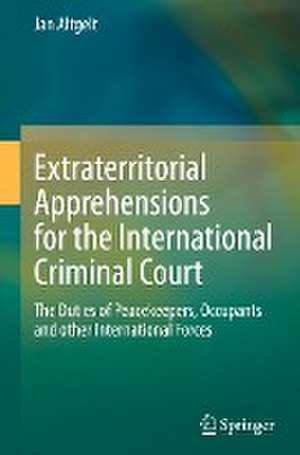Extraterritorial Apprehensions for the International Criminal Court: The Duties of Peacekeepers, Occupants and other International Forces
Autor Jan Altgelten Limba Engleză Hardback – 8 feb 2024
The starting point of this book is the generally shared observation that in violence-torn areas of limited statehood, the civilian population is often subject to deliberate attacks. This violence often escalates to core crimes such as war crimes, crimes against humanity and even genocide. The International Criminal Court (ICC) could potentially deter such crimes. In order to do so, it largely depends on the cooperation of the states on the territory of which alleged core criminals operate. Since such states are often unwilling or unable to cooperate, the book explores whether the ICC could instead seek assistance from international forces such as UN peace support operations, UN-mandated missions, and belligerent occupants.
The book covers, on the one hand, the law and practice of the UN Security Council with regard to mandating international forces to arrest and transfer alleged offenders to the ICC or to other international courts. On the other, it addresses to what extent international forces may or must hand alleged offenders over to the ICC, regardless of such mandates. More precisely, the book examines whether the duties to prosecute genocide, torture, enforced disappearance, grave breaches and other war crimes apply extraterritorially and – if so – whether international forces can discharge these duties by transferring suspects to the ICC.
At the same time, the book addresses the limitations to such extraterritorial action: firstly, to what extent the prohibition of the use of force and the principle of territorial sovereignty restrict extraterritorial deprivations of liberty and transfer to the ICC. Secondly, it explores the restrictions and permissions that the law of occupation and other norms of international humanitarian law impose on such apprehensions and transfers. Finally, it discusses how international forces can uphold the right to liberty and security as well as the principle of non-refoulement when they extraterritorially apprehend ICC suspects. This also reflects the book’s relevance with regard to the more general debate on the extraterritorial application of human rights.
Preț: 1003.70 lei
Preț vechi: 1224.02 lei
-18% Nou
Puncte Express: 1506
Preț estimativ în valută:
192.05€ • 201.06$ • 158.91£
192.05€ • 201.06$ • 158.91£
Carte tipărită la comandă
Livrare economică 07-21 aprilie
Preluare comenzi: 021 569.72.76
Specificații
ISBN-13: 9783031458958
ISBN-10: 3031458958
Pagini: 250
Ilustrații: XV, 250 p.
Dimensiuni: 155 x 235 mm
Greutate: 0.55 kg
Ediția:1st ed. 2024
Editura: Springer International Publishing
Colecția Springer
Locul publicării:Cham, Switzerland
ISBN-10: 3031458958
Pagini: 250
Ilustrații: XV, 250 p.
Dimensiuni: 155 x 235 mm
Greutate: 0.55 kg
Ediția:1st ed. 2024
Editura: Springer International Publishing
Colecția Springer
Locul publicării:Cham, Switzerland
Cuprins
Introduction.- Case Study on MONUSCO, UNOCI and UNAMID.- Potential sources of law for a duty to apprehend core criminals.- Sovereignty-based limitations on extraterritorially apprehending core criminals.- International humanitarian law.- International human rights law.- Concluding remarks.
Notă biografică
Dr. Jan Altgelt works as a senior policy officer at the German Federal Ministry for the Environment. He is a former research associate at the Collaborative Research Centre 700 "Governance in areas of limited statehood," where he completed his doctoral thesis on the duty of extraterritorial military presences to cooperate with international criminal courts and tribunals. Previously, he worked for the legal division of the International Committee of the Red Cross (ICRC) and the International Criminal Tribunal for the former Yugoslavia (ICTY). He holds a Master of Laws (LL.M.) in Public International Law from the University of Nottingham.
Textul de pe ultima copertă
The starting point of this book is the generally shared observation that in violence-torn areas of limited statehood, the civilian population is often subject to deliberate attacks. This violence often escalates to core crimes such as war crimes, crimes against humanity and even genocide. The International Criminal Court (ICC) could potentially deter such crimes. In order to do so, it largely depends on the cooperation of the states on the territory of which alleged core criminals operate. Since such states are often unwilling or unable to cooperate, the book explores whether the ICC could instead seek assistance from international forces such as UN peace support operations, UN-mandated missions, and belligerent occupants.
The book covers, on the one hand, the law and practice of the UN Security Council with regard to mandating international forces to arrest and transfer alleged offenders to the ICC or to other international courts. On the other, it addresses to what extent international forces may or must hand alleged offenders over to the ICC, regardless of such mandates. More precisely, the book examines whether the duties to prosecute genocide, torture, enforced disappearance, grave breaches and other war crimes apply extraterritorially and – if so – whether international forces can discharge these duties by transferring suspects to the ICC.
At the same time, the book addresses the limitations to such extraterritorial action: firstly, to what extent the prohibition of the use of force and the principle of territorial sovereignty restrict extraterritorial deprivations of liberty and transfer to the ICC. Secondly, it explores the restrictions and permissions that the law of occupation and other norms of international humanitarian law impose on such apprehensions and transfers. Finally, it discusses how international forces can uphold the right to liberty and security as well as the principle of non-refoulement when they extraterritorially apprehend ICC suspects. This also reflects the book’s relevance with regard to the more general debate on the extraterritorial application of human rights.
Caracteristici
Provides balanced considerations of prosecution interests with other core values of the international community
Presents comprehensive analysis of extraterritorial prosecution duties in IHRL and IHL instruments
Offers holistic analysis of rights and duties imposed on international forces to surrender alleged offenders
Presents comprehensive analysis of extraterritorial prosecution duties in IHRL and IHL instruments
Offers holistic analysis of rights and duties imposed on international forces to surrender alleged offenders
